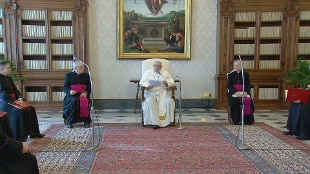Share
March 31, 2021 "The topicality of Rosario Livatino is surprising, because it captures the signs of what would have emerged with greater evidence in the following decades, not only in Italy, that is, the justification for the trespassing of the judge in non-specific areas, especially in matters of so-called 'new rights', with judgments that seem concerned with fulfilling ever new desires, free from any objective limitations ".
This is written by Pope Francis in the preface of the book that the bishop of Catanzaro, Vincenzo Bertolone, dedicated to Rosario Livatino, the "boy judge" who will be proclaimed blessed on 9 May.
An excerpt from the preface is published today by the newspaper "La Repubblica".
"He thought, since he was a law graduate, about the best way to play the role of judge. He suffered a lot in the criminal rulings against the accused, because he noted how freedom, misinterpreted, had broken the rule of justice", continues Bergoglio,
"And at the same moment in which he had to judge according to the law, the problem of forgiveness arose as a Christian. By carrying out an act of total and generous entrustment to God every day, he is a shining point of reference for the men and women of today and of tomorrow, especially for young people who, still today, are ensnared by the mafia siren for a life of violence, corruption, oppression and death. "May his martyrial witness of faith and justice be a seed of harmony and social peace, be an emblem of it is necessary to feel and be all brothers, and not rivals or enemies ", writes the Pope.
" Those said by Judge Rosario Livatino to his assassins - 'Picciotti, what have I done to you?'
- Pope Francis writes, they were "words that shouted against the Herods of our time, those who, not looking innocence in the face, even enlist adolescents to make them become merciless killers in death missions. A cry of pain and at the same time of truth, which with its strength annihilates the mafia armies, revealing the intrinsic denial of the Gospel of the mafias in every form, despite the centuries-old ostentation of holy cards, of sacred statues forced to disrespectful bows, of religiosity heralded as much as denied ".
General audience: "Whoever serves
money is against God"
"Whoever serves money is against God".
This is the Pope's warning during the general audience
broadcast via streaming from the Apostolic Library.
Bergoglio, recalling that from tomorrow the Easter Triduum comes alive, focuses his meditation on the Passion, Death and Resurrection of Christ.
And precisely with regard to the Resurrection, Francis takes the opportunity to issue a warning to the faithful.
"He who was crucified is risen! All questions and uncertainties, hesitations and fears are dispelled by this revelation. The Risen One gives us the certainty that good always triumphs over evil, that life always overcomes death and death. our aim is not to descend lower and lower, from sadness to sadness, but to rise above. The Risen One - says the Pope - is the confirmation that Jesus is right in everything: in promising us life beyond death and forgiveness beyond sins. . The disciples did not believe, the first to believe was Mary Magdalene and then all the disciples who saw him ".
Bergoglio, however, dwells on those who, despite having seen, pretend not to see: "I would like to dwell on the guards and soldiers in the tomb so as not to let the disciples take the body. They saw him risen, the enemies, and then they pretended to not to see him. Why? Because they got paid. "
Hence the lash: "There are two gentlemen in the world: God and money, whoever serves money is against God and here money has changed reality. Let's think how many times Christian men and women paid for not recognizing the resurrection in practice of Christ ".
Francis then recalls the second Easter in the pandemic: "Dear brothers and sisters, this year too we will live the Easter celebrations in the context of the pandemic. In many situations of suffering, especially when people, families and populations already tried by poverty, calamity or conflicts, the Cross of Christ is like a beacon that indicates the port to the ships still out in the stormy sea. It is the sign of hope that does not disappoint; and it tells us that not even a tear, not a groan is lost in the plan of salvation. of God. Don't let yourself be paid to forget the Lord ".

